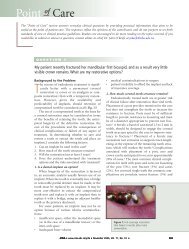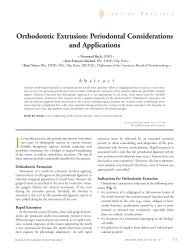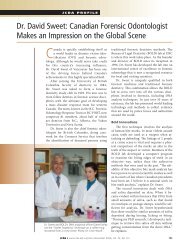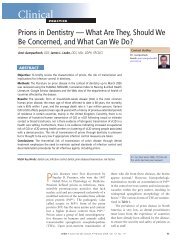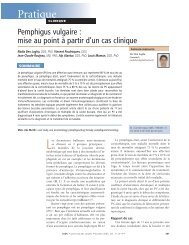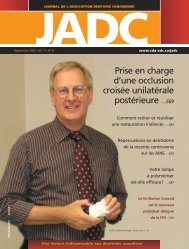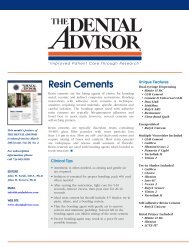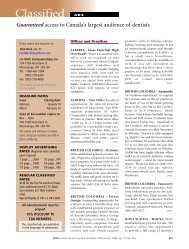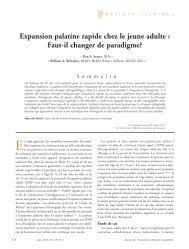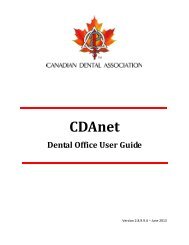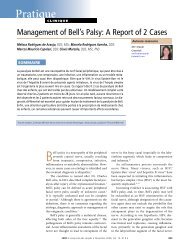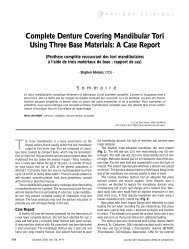JCDA - Canadian Dental Association
JCDA - Canadian Dental Association
JCDA - Canadian Dental Association
You also want an ePaper? Increase the reach of your titles
YUMPU automatically turns print PDFs into web optimized ePapers that Google loves.
Professional<br />
i s s u E s<br />
New Technologies in Health Care. Part 1:<br />
A Moral and Ethical Predicament<br />
Ariane Lebuis; Beverly Lai, BEng; Elham Emami, DMD, MSc;<br />
Jocelyne S. Feine, DDS, HDR<br />
ABSTRACT<br />
With the rapid evolution of technology and the development and marketing of new procedures<br />
in dentistry, dentists have difficulty keeping pace with all of this new technology<br />
and information. How do these clinicians know whether a new product, technique or<br />
technological advance is good and should be recommended? At what point do they have<br />
an obligation to inform their patients about new procedures supported by research? This<br />
first report of a 2-part series investigates the ethical aspects of these issues and describes<br />
some of the professional ethical dilemmas and obligations involved when new therapies<br />
are offered to the public.<br />
For citation purposes, the electronic version is the definitive version of this article: www.cda-adc.ca/jcda/vol-74/issue-7/631.html<br />
Since the 1960s, dentistry has made great<br />
strides in improving diagnoses and<br />
treatments for oral health disorders.<br />
Technological advances in equipment and<br />
materials, such as the air rotor and adhesive<br />
dentistry, have revolutionized the way dentists<br />
practise dentistry. But health professionals are<br />
having problems keeping pace with the exponential<br />
growth in medical knowledge of the<br />
last 20 years. 1 These medical advances have<br />
created many new challenges, as well as opportunities,<br />
for health care professionals.<br />
Increasingly more complex ethical and<br />
moral issues arise out of the development and<br />
implementation of new technologies and new<br />
procedures. 2,3 In particular, when should clinicians,<br />
particularly dentists, inform patients<br />
about new therapies or procedures shown to<br />
be more effective than the current standard<br />
of care? Can dentists continue to provide the<br />
conventional treatments they learned in dental<br />
school without informing patients about new<br />
research-based treatment alternatives?<br />
Contact Author<br />
Dr. Feine<br />
Email: jocelyne.feine@<br />
mcgill.ca<br />
In this first article of a 2-part series, we<br />
discuss the type of information that dentists<br />
can confidently draw on to inform patients<br />
about new technology. We then explore the<br />
ethical and moral obligations when these<br />
health professionals are faced with the dilemma<br />
about whether to inform patients about<br />
a new technology.<br />
This material was gathered from a literature<br />
review and interviews with experts in the<br />
fields of ethics, law and organized dentistry.<br />
The Dilemma<br />
With such a proliferation of new technology,<br />
how can a dentist remain current<br />
about the best and most important of these<br />
innovations? How can dentists be certain that<br />
a new product, technique or technological advance<br />
is good and should be recommended?<br />
On the other hand, what should these clinicians<br />
do when new evidence-based dental<br />
procedures offer better care, but many barriers<br />
to their integration into practice exist, such<br />
<strong>JCDA</strong> • www.cda-adc.ca/jcda • September 2008, Vol. 74, No. 7 • 631



